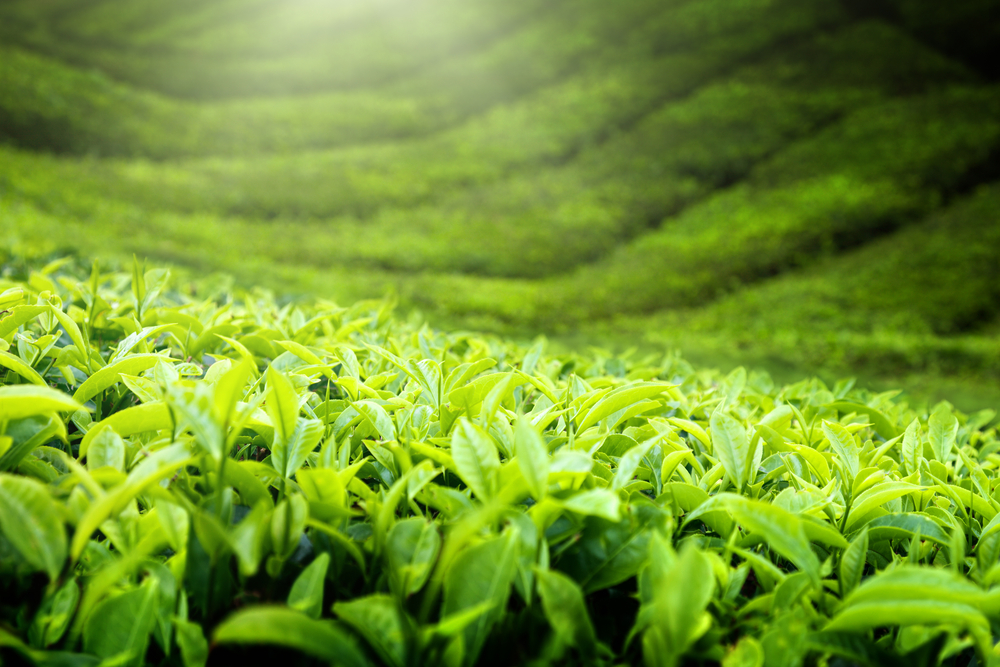L-Theanine: Benefits, Dosage, and Side Effects
Originally published on HVMN by Jamie Witherby
This is a series of blog post which I publish in collaboration with HVMN about keto. Me wife and I had good success on the keto diet. We used it to lose weight before our wedding. Now we batch cook on weekends to be ready for the entire week. Here are some addtional supplement ideas.
Everyone is curious about what the future has in store for them. The difference is what we choose to do with that curiosity.
People attempt to find those answers from many sources, like spiritual leaders and palm reading. Sometimes, they even go looking at the bottom of a cup of tea—tasseography is the ancient practice of reading and interpreting the formations of tea leaves at the bottom of the cup.
But you may not need to get to the bottom of your cup to get to the bottom of what’s to come from drinking it. So, what's in that tea? L-theanine, an umami-rich amino acid found in green tea and black tea leaves.
Table of Contents
L-Theanine: The Past and Present
Can Improve Focus, Memory, and Attention
Powerful Antioxidant Properties
May Interact with Other Medications
We’ll leave tasseography to the pros and tell you what the future holds in terms of L-theanine’s benefits, dosing variations, and possible side effects.
L-Theanine: The Past and Present
To discuss the future, we have to start with the past. L-theanine’s past is rich, owing to its tea drinker origins. While the first credible documentation of drinking tea is as recent as 300 AD, the first teatime probably occurred in the Yunnan province of China during the Shang Dynasty thousands of years ago. If you believe one popular legend, tea wasn’t discovered on purpose. King Shennong had simply boiled water to make it safe to drink when a gust of wind landed tea leaves from the nearby trees into his drink.1 He loved the taste.
King Shennong was also renowned for his willingness to experiment with various herbs and plants to see what effects they would have on him. Lore says his body was translucent so that he could see what was happening on the inside.1 For those of us who aren’t lucky enough (or unlucky enough) to see exactly what’s happening, there’s plenty of research surrounding the effects of tea on our bodies.
L-theanine was first isolated from the gyokuro leaf in a laboratory in Kyoto, Japan in 1949. Gyokuro is a type of green tea with a high L-theanine content, though the amino acid can be found in other green, black, and white teas from Camellia sinensis.2
L-theanine is a non-protein and non-dietary amino acid with a chemical structure and blood-brain barrier crossing similar to major neurotransmitters like glutamic acid and gamma-aminobutyric acid (GABA).3 Like these neurotransmitters, L-theanine is heavily associated with the effects it can have on our moods.
Supplements to reduce stress
Subscribe now to get our list of essential supplements for stress reduction.
L-Theanine: The Benefits
From a research standpoint, L-theanine’s future appears bright. This amino acid has a laundry list of health benefits for both the body and brain.
Reduces Anxiety and Stress
If “busy” is a common response you give when someone asks how you’re doing, you may want to add L-theanine to your future for its most acknowledged advantage: the anxiolytic effect. Translation? It may be able to reduce your stress and anxiety symptoms.
In human studies, L-theanine has been linked to anti-anxiety effects possibly through inhibition of cortical neuron excitation.4 Unfortunately, excitation of your neurons doesn’t always result in feeling particularly excited. It's more like a stimulant, so you may feel physiological and psychological stresses instead.
Our brains are always balancing this activity through the regulation of different types of neurotransmitters (e.g. dopamine, GABA, serotonin), generally categorized by their excitatory and inhibitory effects. But the system isn’t always perfect. The scales can tip in either direction, which can throw things off balance.
When you have an excess of the excitatory neurotransmitters, you may experience stress and/or anxiety.
You may also accidentally activate your sympathetic nervous system, more commonly referred to as the fight-or-flight response.
While the fight or flight response could save your life in a quick-thinking situation, such as a bear attack, it can be a problem when you activate it without really needing it. At best, it may be a sweaty-palmed nuisance for its acute effects. At worst, you may suffer from chronic stress and its accompanying physiological responses, like an increased heart rate and spike in blood pressure, or an impaired immune system.5
The trigger for physiological stress responses is a release of the stress hormone, cortisol, from your adrenal glands. When L-theanine inhibits excitatory responses in the brain, the body’s regular responses will also be inhibited. Heart rate,6 blood pressure, and even salivary stress markers may all decrease with the help of L-theanine.4
May Help with Sleep
If sleeping is one of the ways you prepare yourself for the future, you may think you need a stronger supplement to help you wind down completely. L-theanine may be the perfect one to tuck you in.
Research shows L-theanine has the ability to generate alpha brain waves, which are typically generated during relaxing activities such as meditation.7 When the brain generates alpha waves in the parietal and occipital regions of the brain, you can experience a prolonged calming effect.8
Maybe, in your calm and drowsy state, you accidentally poured yourself a late afternoon cup of coffee from the regular pot rather than the decaf. Don’t worry—L-theanine can help ameliorate the effects of the late-night stimulus.9 Caffeine isn’t just a barrier for your initial drift-off; it’s also a barrier to an adequate amount of slow-wave sleep (SWS), the deepest form of non-REM sleep. In animal studies, L-theanine significantly reversed caffeine’s reductions of slow-wave sleep.9
Human studies have yielded promising results as well. A 2015 study on L-theanine’s sleep benefits, those with schizophrenia found significant improvements in sleep quality. The results suggest that L-theanine’s therapeutic effect is owed to its stabilization of the glutamatergic concentrations in the brain.10 Glutamate is a fellow amino acid. But it’s also one of the major excitatory neurotransmitters playing a significant role in schizophrenia.11
In a clinical trial, L-theanine also helped young individuals with attention deficit hyperactivity disorder (ADHD) with their sleep.12 Sleep problems are common among individuals with ADHD, and sleep disturbances are equally common in the treatment of the disorder. L-theanine was tested for its safety and efficacy as a sleep aid. The amino acid passed: participants not only fell asleep faster but also experienced higher quality deep sleep after supplementing with L-theanine.12
If your sleep could use a safe helping hand, we’ve got you covered with Yawn. Yawn is H.V.M.N.’s non-habit forming sleep aid for faster transitions13 to higher-quality sleep.14 No need to worry about the drowsy aftermath of other sleeping medications; Yawn’s inclusion of fatigue-fighting glycine means you’ll start the day feeling refreshed.15 You may not be able to predict your future, but getting better sleep is an easy way to set yourself up for success.
Can Improve Focus, Memory, and Attention
Maybe sleep isn’t your focus area for improvement; maybe focus is your focus area. If so, surrendering your attention to L-theanine may help it.
Human studies have shown L-theanine can increase focus, reaction times,16 and even visual processing, particularly in conjunction with caffeine.17
When supplementing with L-theanine, participants improved attention task performances for well-rounded cognitive function. But the participants didn’t just perform better; they felt better.
"Better" meaning reductions in self-assessed mental fatigue and increases in alertness.16
Let’s not forget what L-theanine can do for your memory. Consuming L-theanine over time gives it a chance to help protect the neurons in your brain from injury and death.18 For those with Alzheimer’s disease, this benefit is huge. In a 2009 mouse model studying a pathological mechanism of Alzheimer’s, L-theanine was found to attenuate its cognitive dysfunction through a reduction of associated oxidative damage.19
Powerful Antioxidant Properties
We utilize antioxidants to remove an excess of cell-damaging free radicals from our bodies. When our cells and tissues are damaged, it contributes to a host of larger issues and accelerates the arrival of diseases such as heart disease, cancer, and diabetes.
L-theanine’s ability to protect brain cells against oxidative damage contributes to its lengthening certification as an antioxidant. In addition to boosting the production of an infection-fighting antibody,20 L-theanine has been shown to provide direct neuroprotection against neurotoxicants.21
L-Theanine: The Side Effects
If you’ve taken sleeping pills before, you know they can get you to bed easily. But getting out of it the next morning? Nearly impossible. The negative side effects of these and other medications may have you making pros and cons lists.
While L-theanine isn’t completely without consequences, your “cons” list won’t be longer than the aforementioned benefits.
Generally Safe
In essence, taking L-theanine is generally considered safe. It hasn’t been linked with any severe adverse effects. But let’s examine the word “adverse” more closely to understand what this description means.
Adverse means “causing harm.” If a medication or supplement “causes harm,” it will be noted. One step further, a “severe adverse” reaction is defined as anything that could be life-threatening, resulting in death, or resulting in a persistent or significant disability.22Think liver failure, serious allergic reactions, and abnormal heart rhythms.
L-theanine has also been tested for its toxicity at extremely high levels.23
The results? L-theanine was still tolerated well after two weeks of supplementing with doses nearly sixty times the usual amount used in animal and human studies.
You won’t know the effects of L-theanine until you take it yourself. But numerous clinical trials and research findings have given us a sense of what you should be prepared to experience. The most common side effects of L-theanine dosage include headaches, nausea, and irritability.24 However, the nausea appears to be mostly linked with L-theanine being administered through green tea rather than dietary supplements. Similarly, the irritability side effect accompanies the dual administration of caffeine and L-theanine.
No Sedative Side Effects
Even though L-theanine can increase focus and attention, you may be shy to use it because you’re worried its bedtime benefits will kick in during the day.
Luckily, L-theanine is not associated with sedative side effects, despite the stress reduction. L-theanine can generate alpha brain waves associated with relaxation, but these waves will not induce drowsiness.7
May Interact with Other Medications
Because L-theanine doesn’t induce daytime drowsiness in its relaxing effects, you won’t have to worry about it slowing you down. But it may slow your body down without you realizing it.
Remember that L-theanine supplements are able to reduce cortisol levels to inhibit your physiological stress responses. Even if they’re not the target of your L-theanine dose, you should always bear these effects in mind, especially if you’re taking L-theanine in tandem with other medications and supplements.
The dynamic duo: heart rate and blood pressure. L-theanine reduces both, particularly if an individual has high blood pressure.25 However, if you’re already on blood pressure medications, be aware that the effects could be either ameliorated or intensified through the introduction of the amino acid.
You should always discuss possible medication and supplement pairings with your healthcare provider before you try them.
L-Theanine: The Dosing
If you are ready to talk to your doctor about adding L-theanine to your daily (or nightly) routine, you’ll want to talk about the appropriate dose.
Safety
Remember that L-theanine is generally considered safe, even in high doses. The extremely high levels were around 4000mg - 6500mg each day. But just because L-theanine didn’t induce toxicity at extremely high levels doesn’t mean you should take exorbitant amounts of this amino acid to achieve the ultimate calm or increase your cognitive performance.
There is no current recommended dosage of L-theanine set by the Food and Drug Administration (FDA). However, clinical trials tend to administer the supplements between 100mg - 250mg.26 That’s about ten times higher than what you’ll find in a single cup of green tea.26 Save yourself the future stomach ache of ingesting that much tea and dose accordingly.
Synergy with Caffeine
If you’re looking to get an extra boost from your L-theanine without upping the milligrams, you may want to try pairing it with classic caffeine.
When taken together, the combination of L-theanine and caffeine can have a synergistic effect: increased reaction times,16 improvements in acute attention,27 and task switching.28Further, because L-theanine is linked to better cerebral blood flow, it can reduce caffeine intake headaches.
That’s precisely why H.V.M.N.’s nootropic stack, Sprint, features both caffeine and L-theanine. While the effects of caffeine get you moving, the L-theanine keeps those physiological stress responses at bay to let you focus on your work. No headaches, jitters, or crashes. Just six hours of a productive mental flow.
The key to their success in Sprint and other supplements is proper dosing. If the balance is off, the effects may not be as noticeable. If you’re looking for the improved alertness without the jittery headaches, you should supplement every 150mg caffeine with about 250mg of L-theanine.16
The Future of L-Theanine
Even if you weren’t blessed with the ability to translate the tea leaf traces swirling around your cup, you may be able to exert better control over your own future by supplementing with one of the leaves’ core components.
Your future with the appropriate daily dose of L-theanine could mean less anxiety and stress, better quality sleep, a protective effect on your cells, and an attention boost in the mornings to get you going. And we predict you’re going to love it.
Scientific Citations
|
1. |
Heiss ML, Heiss RJ. The Story of Tea, A Cultural History and Drinking Guide. Ten Speed Press; 2011. |
|
2. |
|
|
3. |
|
|
4. |
|
|
5. |
|
|
6. |
|
|
7. |
|
|
8. |
|
|
9. |
|
|
10. |
|
|
11. |
|
|
12. |
|
|
13. |
|
|
14. |
|
|
15. |
|
|
16. |
|
|
17. |
|
|
18. |
|
|
19. |
|
|
20. |
|
|
21. |
|
|
22. |
|
|
23. |
|
|
24. |
|
|
25. |
|
|
26. |
|
|
27. |
|
|
28. |


